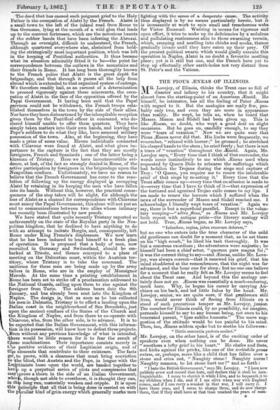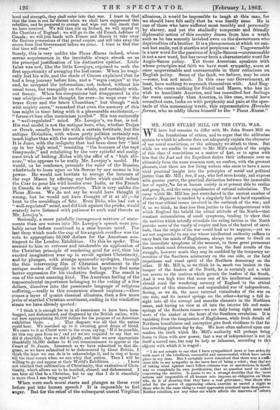THE PIOUS .7ENEA8 OF ILLINOIS.
MR. Lovejoy, of Illinois, thinks the Trent case so full of disaster and infamy to his country, that it might almost form the starting-point of an American 2Eneid. He himself, he intimates, has all the feeling of Pater lEneas with regard to it. But the analogies are really few, probably only two, and even they are more in appearance than reality. He wept, he tells us, when he heard that Messrs. Mason and Slidell had been given up. This is likeAneas' no doubt, who wept a good deal on slight occasions. But he goes on, candidly enough, to say they were "tears of vexation." Now we are quite sure that Pious 2Eneas never did that. His limbs were frequently, we remember, "relaxed with horror ;" he groaned, he stretched his clasped hands to the stars; he cried freely ; but there is not a trace of "vexation" throughout the 2Eneid. Again, Mr. Lovejoy says, "Every time that I think of that surrender, the words come instinctively to me which 2Eneas used when requested by Queen Dido to rehearse the sufferings which had befallen the Trojans during the siege and capture of Troy 0 Queen, you require me to renew the intolerable grief of that siege by re-acting it.' Every time that the Trent affair Comes up—every time that an allusion is made to it—every time that I have to think of it—that expression of the tortured and agonized Trojan exile comes to my lips. I am made to renew the horrors which I suffered when the news of the surrender of Mason and Slidell reached me. I acknowledge I literally wept tears of vexation." Again we say, there is but a superficial paralleL Except in the voluntary weeping—" ultra fleas,' as 2Eneas and Mr. Lovejoy both repeat with antique pride—the literary analogy will not hold. True, 2Eneas began, as Mr. Lovejoy says, "Infandum, regina, jabes renovare dolorem," but no one who enters into the true character of the mild old gentleman can doubt for a moment that, as he sat there on his "high couch," he liked his task thoroughly. It was but a sonorous exordiura ; the adventures were majestic; he himself had been a chief actor, "quorum pars magna fui ;" it was the correct thing to say—and 2Eneas, unlike Mr. Lovejoy, was always correct—that it renewed his grief, that his mind shuddered at the remembrance, that the night was far advanced, and the hour one for sleep : but no one can believe for a moment that he really felt as Mr. Lovejoy seems to feel about the Trent case. And beyond this the analogy certainly does not go. lEneas was essentially a much-enduring, meek hero. Why, he began his career by carrying Anchises on his back, and led little lulus by the hand. Mr. Lovejoy, senior, we are quite sure, if that gentleman still lives, would never think of fleeing from Illinois on a steed of such precarious temper as Mr. Lovejoy, junior. The member for Illinois could, by no possibility, we imagine, persuade himself to say to any human being, not even to his venerated parent, "Ipso subibo humeris." The mere suggestion of the attitude would be too painful to his mind. Then, too, 2Eneas seldom spoke but to soothe his followers:
" Dictis merentia pectom mulcet."
Mr. Lovejoy, on the other hand, is of the exciting order of speakers even when nothing can be done. He never "smothers a lofty grief in his heart." He chafes and frets, and kicks against the pricks, like one of the irtitabile genus vat urn, or, perhaps, more like a child that has fallen over a stone and cries out, "Naughty stone! Naughty nurse ! Naughty mamma, to let stone hurt me !" and so forth : "I hate the British Government," says Mr. Lovejoy. "I here now publicly avow and record that hate, and declare that it shall be inextinguishable. I mean to cherish it while I live, and to bequeath it to my children when I die, and if I am alive when war with England comes, and if I can carry a musket in that war, I will carry It. I have three sons, and I mean to charge them, and do now charge them, that if they shall have at that time reached the years of man hood and strength, they shall enter into that war. I trust in God that the time is not far distant when we shall have suppressed this rebellion, and be prepared to avenge and wipe out this insult that we have received. We will then stir up Ireland, we will appeal to the Chartists of England ; we will go to the old French habitans of Canada; we will join hands with France and Russia to take away the Eastern possessions of that proud empire, and will take away the crown from that Government before we cease. I trust in God that that time will come."
Surely, this is very unlike the Pious Eneas indeed, whose serene acquiescence in the inevitable always struck us as the principal justification of his distinctive epithet. Little lulus was not, like the little Lovejoys, enjoined to seek the first opportunity of avenging the lost cause. When he tragically lost his wife, and the shade of Creusa explained that he had a long journey before him, and a " regia conjux" at the end, he accepted the information, not, indeed, without his usual tears, but tranquilly on the whole, and certainly without frenzy. When his companions had disappeared in the vast whirlpool—as he thought, for ever—he wept over "the brave Gyas and the brave Cloanthus," but though "sick with mighty cares," remarked that even the memory of this loss might in time bring with it a pleasurable excitement,— " forsan et lime olim meminisse juvabit." His was eminently a "well-regulated" mind. Mr. Lovejoy's, we fear, is not. His real model is not the antique hero, who, whether Trojan or Greek, usually bore life with a certain fortitude, but the antique Divinities, with whom party politics certainly ran much higher than with the mortals through whom they acted. It is Juno, with the indignity that had been done her "laid up in her high mind," resenting "the honours of the rapt Ganymede," and retaliating by the very spiteful and malignant trick of bribing Eolus with the offer of a "high alliance," who appears to be really Mr. Lovejoy's model. He would, as he confesses, persuade the ruler of the Russian whirlwinds to loose upon us his Boreas by any means in his power. He would not hesitate to avenge the honours of the rapt Mason by offering any bribe which could induce the Czar to pour his wild hordes over India, or the French in Canada to stir up insurrection. This is very unlike the Pious Eneas. We do not say he would have thought it wrong, but he would not have thought of it at all ;—he bent to the mouldings of fate. Even Dido, who had not a "well-regulated" mind, and did kick against the pricks, would scarcely have listened with patience to such mad threats as Mr. Lovejoy's. Seriously, a more painfully incongruous mixture of statements than are woven into Mr. Lovejoy's speech were probably never before combined in a sane human mind. The last drop which made the cup of his anguish overflow was the vote to appropriate 35,000 dollars for the American contingent to the London Exhibition. On this he spoke. This seemed to him so extreme and intolerable an application of the Christian principle of rendering good for evil, that his excited imagination rose up in revolt against Christianity, and he plunges, with strange spasmodic apologies, through the thin intervening film of Christian sentiment to the antique modes of thought in which he hopes to find some better expression for his vindictive feelings. The result is one of the most amazing kind. The American feeling of the transcendental importance belonging to the voting of a few dollars, dissolves into the passionate language of religious suffering,—really in this connexion almost impious ;—then comes a layer of quaint classical allusions, then a few more jerks of startled Christian sentiment, ending in the vindictive strain we have already quoted : "I think it is enough for us in all conscience to have been humbugged, and dishonoured, and disgraced by the British nation, without now appropriating 35,000 dollars for the purpose of an American exhibition there. . . . That disgrace was all that the nation could bear. We marched up to it sweating great drops of blood. We came to it as Christ went to the cross, saying, If it be possible, let this cup pass from us ;' and yet we are required to say that we did it cheerfully, that we did it gladly, and that we now appropriate thankfully 35,000 dollars to fit out commissioners to appear at the Court of St. James. Inasmuch as we have submitted to that disgrace, as we have submitted to be dishonoured by Great Britain, I think the least we can do is to acknowledge it, and to stay at homp till the time comes when we can whip that nation. Then I will be willing to go and appear at their World's Exhibition. . . . I have not reached that sublimation of Christianity, that exaltation of Christianity, which allows me to be insulted, abused, and dishonoured. I can bear all that Its a Christian, but to say that I do it cheerfully is more than I can bring myself to."
-When were such moral starts and plunges as these ever before put into human speech ? It is impossible to feel anger. But for the relief of the subsequent unreal Virgilian allusions, it would be impossible to laugh at this man, for we should have felt sadly that he was hardly sane. He is one of those who have suffered most terribly and personally by slavery, and yet the studiedly temperate and friendly diplomatic action of this country draws from him a wrath such as he has scarcely lavished even on the slaveowners who deprivedhim of a brother. It is a phenomenon at which we cannot but smile, yet it startles and perplexes us: Ungovernable is a new word for the passions of Anglo-Saxons—unreasonable is not anew word, but has never been a characteristic word for Anglo-Saxon policy. Yet those American speakers with whose principles and faith we have most sympathy, seem at once ungovernable and unreasonable in their criticisms on English policy. Some of the fault, we believe, may be ours —some, but not much. In this case our Government, at least, have nothing to reproach themselves with. And England, who cares nothing for Slidell and Mason, who has no wish to humiliate America, and has consulted her feelings far more anxiously than America, in like case, would have consulted ours, looks on with perplexity and pain at the spectacle of this unmeaning wrath, this representative Hercules furens, who so oddly likens himself to the "Pious Emits."































 Previous page
Previous page